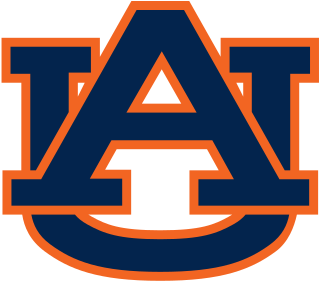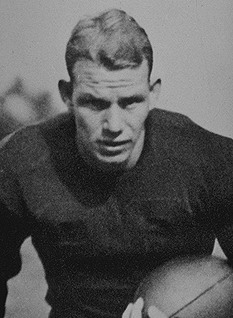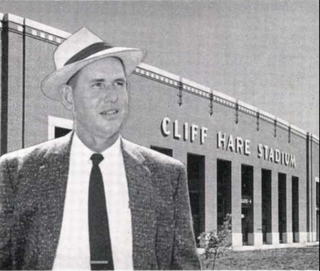
Auburn University is a public land-grant research university in Auburn, Alabama. With more than 26,800 undergraduate students, over 6,100 post-graduate students, and a total enrollment of more than 33,000 students with 1,330 faculty members, Auburn is the second-largest university in Alabama. It is one of the state's two flagship public universities. The university is one of 146 U.S. universities classified among "R1: Doctoral Universities – Very High Research Activity".

The Auburn Tigers are the athletic teams representing Auburn University, a public four-year university located in Auburn, Alabama, United States. The Auburn Tigers compete in Division I of the National Collegiate Athletic Association (NCAA) as a member of the Southeastern Conference (SEC).

James Ralph "Shug" Jordan was an American football, basketball, and baseball player and coach of football and basketball. He served as the head football coach at Auburn University from 1951 to 1975, where he compiled a record of 176–83–6. He has the most wins of any coach in Auburn Tigers football history. Jordan's 1957 Auburn squad went undefeated with a record of 10–0 and was named the national champion by the Associated Press. Jordan was also the head men's basketball coach at Auburn and at the University of Georgia (1946–1950), tallying a career college basketball record of 136–103. During his time coaching basketball, he also served as an assistant football coach at the two schools. Auburn's Jordan–Hare Stadium was renamed in Jordan's honor in 1973. Jordan was inducted into the College Football Hall of Fame as a coach in 1982.
Clifford Leroy Hare was a member of Auburn University’s first football team who went on to serve as chair of the Auburn Faculty Athletic Committee. Auburn’s football stadium, Jordan–Hare Stadium, is co-named for the longtime professor and dean of the School of Chemistry. He served as president of the Southern Conference before the formation of the Southeastern Conference.
Patrick Fain Dye was an American football player, coach, and college athletics administrator. He served as the head football coach at East Carolina University (1974–1979), the University of Wyoming (1980), and Auburn University (1981–1992) compiling a career college football record of 153–62–5. While the head coach at Auburn, he led the team to four Southeastern Conference (SEC) championships and was named the SEC Coach of the Year three times. He served as the athletic director at Auburn from 1981 to 1991 and was inducted into the College Football Hall of Fame as a coach in 2005. On November 19, 2005, the playing field at Auburn's Jordan-Hare Stadium was named "Pat Dye Field" in his honor.

Beard–Eaves–Memorial Coliseum is a 10,500-seat multi-purpose arena on the campus of Auburn University in Auburn, Alabama. The arena, which opened in 1969, is best known as the former home of the Auburn men's and women's basketball, women's gymnastics, and wrestling teams. The teams finished their stays at the facility at the end of the 2009–10 season, with all of its tenants moving into the new Auburn Arena opening in time for the 2010–11 season. In addition to sports, numerous concerts were held in the facility. The coliseum continues to house athletics offices as well as classrooms and office space for Auburn's Department of Geosciences.
Patrick Joseph Sullivan was an American professional football player and college coach. An All-America quarterback for the Auburn Tigers, he won the Heisman Trophy in 1971 and then played six seasons in the National Football League (NFL) with the Atlanta Falcons and Washington Redskins. Sullivan was a head football coach at Samford University, a position he held from 2007 to 2014. He was previously the head football coach at Texas Christian University (TCU) from 1992 to 1997 and the offensive coordinator at the University of Alabama at Birmingham (UAB) from 1999 to 2006. He was inducted into the College Football Hall of Fame as a player in 1991.

Michael Terrence Holland was an American college athletics administrator and basketball player and coach. Holland served as the head men's basketball coach at Davidson College from 1969 to 1974 and at the University of Virginia from 1974 to 1990, compiling a career college basketball coaching record of 418–216. Following his retirement from coaching, Holland was the athletic director at Davidson from 1990 to 1994, at Virginia from 1994 to 2001, and at East Carolina from 2004 to 2013.

The Auburn Tigers football program represents Auburn University in the sport of American college football. Auburn competes in the Football Bowl Subdivision (FBS) of the National Collegiate Athletic Association (NCAA) and the Western Division of the Southeastern Conference (SEC).

The Alabama Crimson Tide football program represents the University of Alabama in the sport of American football. The team competes in the Football Bowl Subdivision (FBS) of the National Collegiate Athletic Association (NCAA) and the Western Division of the Southeastern Conference (SEC). The team is currently led by Kalen DeBoer. The Crimson Tide is among the most storied and decorated football programs in NCAA history. Since beginning play in 1892, the program claims 18 national championships, including 13 wire-service national titles in the poll-era, and five other titles before the poll-era. From 1958 to 1982, the team was led by Hall of Fame coach Paul "Bear" Bryant, who won six national titles with the program. Alabama then had a dominant run under head coach Nick Saban between 2007 and 2023, resulting in six further national titles.

James Franklin Hitchcock Jr. was an American college football player and Major League Baseball player during the Depression Era. Hitchcock played for the Auburn Tigers football team of Auburn University, where he was the school's first All-American in both football and baseball.

The Auburn Tigers men's basketball program is the intercollegiate men's basketball team that represents Auburn University. The school competes in the Southeastern Conference in Division I of the National Collegiate Athletic Association (NCAA). The Tigers play their home games at Neville Arena in Auburn, Alabama on the university campus. The program began in 1906, and is currently coached by Bruce Pearl.

The Auburn Tigers baseball team represents Auburn University in NCAA Division I college baseball. Along with most other Auburn athletic teams, the baseball team participates in the Western division of the Southeastern Conference. The Tigers play their home games on campus at Plainsman Park, and they are coached by Butch Thompson.
Jay Jacobs is an American college athletics director who most recently served as the executive associate athletics director for external affairs for the Florida Gators and was the former director of athletics for the Auburn Tigers athletic department from 2004 to 2017. He was named Auburn's 14th director of athletics on December 22, 2004, after working in almost every area of the Auburn athletic department for the previous 20 years. Jacobs announced on November 3, 2017 that he would step down effective June 1, 2018, and a replacement was announced and hired in January 2018.
Melvin "Mel" Rosen was an American track coach.

Garland Washington "Jeff" Beard was the athletic director at Auburn University from 1951 to 1972. He hired Ralph Jordan as the Auburn Tigers football coach and expanded the seating capacity at Cliff Hare Stadium from 20,000 to 63,000, and oversaw the construction of Beard–Eaves–Memorial Coliseum. He has been inducted into the Alabama Sports Hall of Fame and the Athletic Director Hall of Fame.

James Kirk "Runt" Newell was an American football and baseball player for the Auburn Tigers of Auburn University. He lettered four years in both, as well as once in each of basketball, track, and soccer. He was inducted into the Alabama Sports Hall of Fame in 1994.

Joel Harry Eaves was an American college football and basketball player, coach, and athletic director. He is perhaps most known for coaching basketball at his alma mater, the Auburn Tigers of Auburn University. He is the all-time winningest coach in Auburn basketball history. He was also once athletic director for the Georgia Bulldogs. Eaves was inducted into the Alabama Sports Hall of Fame in 1978.
The Auburn Tigers football team represents Auburn University in American football.

Woodrow "Woody" McCorvey is a long-time American football coach and administrator who currently serves as the Chief of Football Administration at Clemson University. He has spent more than four decades in college football, including two stints at Clemson in various capacities and coaching roles at four Southeastern Conference programs during his career. McCorvey coached at the Division I level for 26 years, earning bowl berths in 17 of those seasons, and coached or signed 36 players who went on to professional football careers as well. He worked for three coaches in the College Football Hall of Fame, including holding significant roles under Danny Ford, Gene Stallings and Phil Fulmer, and worked for four national championship coaches in Ford, Fulmer, Stallings and Dabo Swinney.










